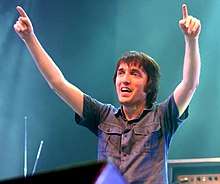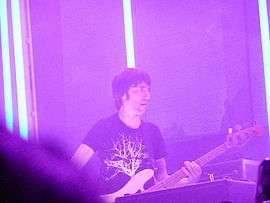Colin Greenwood
Colin Charles Greenwood (born 26 June 1969) is an English musician and the bassist for the alternative rock band Radiohead. Along with his younger brother, Radiohead guitarist Jonny Greenwood, Greenwood attended Abingdon School in Oxford, England, where he met the future band members. Radiohead have since achieved critical acclaim and have sold over 30 million albums. Along with bass guitar, Greenwood plays upright bass and electronic instruments.
Colin Greenwood | |
|---|---|
 Colin Greenwood, Bonnaroo, 17 June 2006 | |
| Background information | |
| Birth name | Colin Charles Greenwood |
| Born | 26 June 1969 Oxford, England |
| Genres | Alternative rock, art rock, electronic, film score |
| Occupation(s) | Musician, bassist, composer |
| Instruments | Bass guitar |
| Years active | 1985–present |
| Associated acts | Radiohead, Tamino |
| Website | www |
Early years
Greenwood, whose father served in the British army,[1] lived in Germany as a child for enough time to become fluent in German.[2] He is the older brother of Radiohead guitarist Jonny Greenwood.[3] The family historically had ties to the British Communist Party and the Fabian Society.[4] Greenwood credited his older sister, Susan, with influencing his and his brother Jonny's taste in music as an adolescent: "She’s responsible for our precocious love of miserable music. The Fall, Magazine, Joy Division. We were ostracised at school because everyone else was into Iron Maiden."[5]
When Greenwood was 12, he met future Radiohead singer Thom Yorke at Abingdon School, an independent school for boys in Oxford.[6] Their future bandmates Ed O'Brien, whom Greenwood met during a school production of the opera Trial by Jury, and Philip Selway also attended the school.[7]
Greenwood bought his first guitar when he was 15.[8] He studied classical guitar under the Abingdon music teacher Terence Gilmore-James, who introduced him and the other future members of Radiohead to jazz, film scores, postwar avant-garde music, and 20th-century classical music. Greenwood said: "When we started, it was very important that we got support from him, because we weren't getting any from the headmaster. You know, the man once sent us a bill, charging us for the use of school property, because we practiced in one of the music rooms on a Sunday."[1]
According to Greenwood, he began playing bass out of necessity, teaching himself by playing along to New Order, Joy Division and Otis Redding. Among his musical influences are Booker T and the MGs, Bill Withers and Curtis Mayfield.[2] He said: "We were people who picked up their respective instruments because we wanted to play music together, rather than just because we wanted to play that particular instrument. So it was more of a collective angle, and if you could contribute by having someone else play your instrument, then that was really cool. I don’t think of myself as a bass player anyway. I’m just in a band with other people."[6]
Greenwood studied English at Peterhouse, Cambridge between 1987 and 1990, and read modern American literature including Raymond Carver, John Cheever and other postwar American writers.[9]
Radiohead

In late 1991, after a chance meeting between Colin Greenwood and A&R representative Keith Wozencroft at Our Price, the record shop where Greenwood worked,[10] On a Friday signed a six-album recording contract with EMI and changed their name to Radiohead.[11] By 2011, Radiohead had sold more than 30 million albums worldwide.[12] They were inducted into the Rock and Roll Hall of Fame in March 2019.[13]
Greenwood mostly plays fingerstyle, and described himself as "rubbish with a pick".[14] He mainly uses Fender basses and Ampeg and Ashdown amplifiers.[14] He also plays instruments including double bass and synthesisers.[14] He said: "My involvement is to play bass guitar, but our ideas and suggestions in certain areas, as to where the music should go or develop, are listened to. We are very much a band."[15]
Of being in a band with his younger brother Jonny, Colin said: "Beyond the normal brotherly thing, I respect him as a person and a musician."[8] On another occasion, he said: “It’s wonderful, it’s good, it makes my promise to keep an eye on him for my mother a lot easier, having him right next to me all the time. But he’s very easy to look after anyway, 'cause he’s very well behaved."[3]
Other work
In 1997, Greenwood participated in a marketing campaign for his alma mater Cambridge University, posing for a photo with students from both state and private schools for a poster titled "Put Yourself in the Picture". The poster was "designed to break down some of the stereotypes that deter able students from applying to Cambridge and encourage more state school applicants".[16]
Greenwood contributed bass to Jonny Greenwood's debut solo work Bodysong (2003), the score for the 2008 film Woodpecker,[17] the 2018 album Amir by Belgian-Egyptian singer Tamino,[18] and Earth (2020), the debut solo album by his Radiohead bandmate Ed O'Brien.[19] He contributed beat programming to Yorke's 2014 solo album Tomorrow's Modern Boxes.[20]
In 2004, Greenwood participated on a panel in the annual sixth form conference run by Radley College in collaboration with School of St Helen and St Katharine, speaking on digital-rights management (DRM) from.[21] In 2013, Greenwood soundtracked a Dries van Noten runway show, performing solo bass guitar.[22] In 2018, he reviewed Michael Palin's book Erebus: The Story of a Ship for the Spectator.[23]
Personal life
Greenwood enjoys writers such as Thomas Pynchon, V.S. Naipaul and Delmore Schwartz.[24] In December 1998, he married Molly McGrann, an American literary critic and novelist.[25][26] They have three sons, Jesse,[27] born in December 2003, Asa, born in December 2005, and Henry, born in December 2009. They live in Oxford.[28]
Greenwood is an amateur photographer.[24] In 2003, he discussed his favourite photographs in the Victoria and Albert Museum, choosing images by Frederick Sommer and Harold Edgerton among others.[29]
See also
References
- Ross, Alex (21 August 2001). "The Searchers: Radiohead's unquiet revolution". The New Yorker. Archived from the original on 25 May 2007. Retrieved 2007-06-14.
- Eshun, Kodwo (21 June 2001). "The A-Z on Radiohead: An interview with Colin Greenwood". Culture Lab UK. Archived from the original on 7 February 2012. Retrieved 14 June 2007.
- Davis, Jason (1 February 1998). "Interview with Colin Greenwood". Channel V, Australia. Archived from the original on 15 January 2007. Retrieved 17 June 2007.
- "Radiohead". UNCUT Magazine. 1 August 2001.
- Hendrickson, Matt (16 October 1997). "Dream Weavers". Rolling Stone. Archived from the original on 21 February 2012. Retrieved 17 June 2007.
- Kelly, John (15 September 2001). "Taking Music To Strange Places". The Irish Times. Retrieved 16 June 2007.
- Myers, Caren (1 November 1993). "Dork Radio". Details. Archived from the original on 21 February 2012. Retrieved 16 June 2007.
- Clark, Stewart (12 July 1995). "Transistor Act". Hot Press. Retrieved 16 June 2007.
- Kent, Nick (1 June 2001). "Happy Now?". MOJO. Archived from the original on 6 February 2012. Retrieved 2007-03-26.
- "Radiohead, Foals and 25 years of discovering Oxford music - BBC News". BBC News. Retrieved 14 March 2016.
- Ross, Alex (20 August 2001). "The Searchers". The New Yorker. Archived from the original on 14 February 2008. Retrieved 16 March 2011.
- Jonathan, Emma. "BBC Worldwide takes exclusive Radiohead performance to the world". BBC. 3 May 2011. Retrieved 15 June 2011.
- Greene, Andy; Greene, Andy (30 March 2019). "Radiohead, Stevie Nicks, The Cure, Janet Jackson Enter Rock Hall at Epic Ceremony". Rolling Stone. Retrieved 1 April 2019.
- D'Auria, Jon. "Colin Greenwood: How To Disappear Completely". Bass Magazine. Retrieved 6 May 2020.
- MacDonald, Patrick (4 February 1998). "Radio wave: Britain's band rides crest of superstardom with low-wattage egos". Seattle Times. Archived from the original on 6 February 2012. Retrieved 2007-06-17.
- "Annual Report: All Access". University of Cambridge Annual Report. 21 August 1997. Archived from the original on 17 March 2007. Retrieved 2007-06-14.
- Solarski, Matthew (5 August 2008). "Radiohead, Clap Your Hands guys team for soundtrack". Pitchfork. Archived from the original on 5 August 2008. Retrieved 20 December 2019.
- "Is Tamino the heir to Jeff Buckley?". The Independent. Retrieved 2 December 2018.
- Schatz, Lake (2 December 2019). "Radiohead's Ed O'Brien to release debut solo album in 2020, new single "Brasil" coming this week". Consequence of Sound. Retrieved 3 December 2019.
- Tomorrow's Modern Boxes vinyl packaging
- Smith, David (8 November 2006). "Today, Truth!". Preoccupations. Archived from the original on 28 September 2007. Retrieved 16 June 2007.
- "Watch: Radiohead's Colin Greenwood Performs Solo at Dries van Noten Fashion Show". Pitchfork. Retrieved 27 January 2020.
- "Radiohead's Colin Greenwood Reviews New Michael Palin Book | Pitchfork". pitchfork.com. Retrieved 30 September 2018.
- Kim, Wook. "School of Rock: 10 Supersmart Musicians". Time. ISSN 0040-781X. Retrieved 8 August 2018.
- "Class Notes 2000". Skidmore Scope Magazine. 1 August 2000. Retrieved 16 June 2007.
- Klosterman, Chuck (1 June 2003). "Fitter Happier: Radiohead Return". Spin. Archived from the original on 29 September 2007. Retrieved 17 June 2007.
- Greenwood, Colin (1 April 2005). "Operatic". Thrasher Magazine. Archived from the original on 12 October 2007. Retrieved 2007-06-17.
- "Giving Back From The Bassline". Mail & Guardian. 1 February 2013. Retrieved 1 February 2013.
- "Photography collection at the V&A redisplayed and online". Cognitive Applications News. 1 May 2003. Archived from the original on 6 July 2007. Retrieved 15 June 2007.